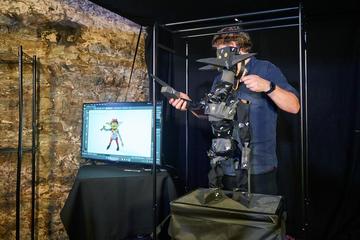As anyone working at the cutting-edge of new digital technology knows, keeping ahead of the latest developments in the tech is both a critical and a thankless task. We might want to ensure that projects are fully future-proofed, but today’s ‘bleeding edge’ technology can immediately be rendered antiquated with every new product and platform announcement.
Nowhere is this more true than in the immersive sector, where new developments in Virtual Reality are released with bewildering frequency. This was made invigoratingly clear at the MyWorld conference on Creative Tech and the Future of Immersive Industries, held in Bristol last week.
We at the Fantasy Futures project – a novel Augmented Reality experience of the Oxford cityscape – went along to discover the emerging innovations and trends – and were blown away by the pace of change and ambition within the sector.
It is today possible to realise the most impossible things.
The nugget of inspiration above from the pioneering twentieth-century illusionist and film director Georges Méliès was how the Keynote & Panel Discussion were opened by Graham Bell, Senior Market Strategist at Amazon Web Services. He forecast a whole host of trends that will emerge in the coming years, from advances in generative AI (soon to replace VAR referees!); to digital twins revolutionizing the ambition and speed of scientific experimentation; to a surge in innovation in smarter, greener ways to generate and store energy.
A lively panel discussion then explored how our current understanding of innovation will need to undergo a seismic shift to allow the potential of people and technologies within the sector to flourish.
May Abdalla, Co-Founder and Director of Anagram Immersive, offered her experience at the vanguard of the immersive revolution to advocate the importance of rapid prototyping and R&D.
"If you talk about something three times, you have to just get on and do it", she advised, conveying the necessary spirit of embracing the unknown in developing products, and a preparedness to be agile and responsive in development and testing.
If you talk about something three times, you have to just get on and do it.
She spoke of the importance of effectively fostering both “the naivety of the person who enjoys imagining, and the crunch point of the tech needed to make it happen”. Acknowledging the risks involved in pushing the boundaries with these cutting-edge ventures, she identified ‘creative clusters’, or collaborative shared workspaces, such as the Watershed in Bristol, as crucial to fostering productive learning environments:
When you’re trying to be experimental with tech, you can easily make some very expensive mistakes – you do need a community to learn from – so you don’t repeat the same costly mistakes that others have already made!
Dr Vicki Williams, Senior Policy, Research and Engagement Manager at Digital Catapult, assessed the policymaking environment, pointing to welcome signs of a more pro-innovation approach to regulation, and predicted that: "IP protection with AI is going to be huge."
One of the primary objectives of the Fantasy Futures project is that the prototyping process will generate some unique IP, so IP protection is top of our minds, and this emerging development is certainly one that we’ll be watching closely.
Matt Browning, Head of Investment at Creative UK, closed the panel discussion by revealing some of the secrets of the average investor’s mindset. Perhaps unsurprisingly, one of their main concerns is the perceived risk of any investment, and therefore it is imperative for creatives to demonstrate how revenue will be generated from an intangible innovation that might still be at the early stage of development. His advice to identify the value you create as a team around the intangible assets you are seeking investment for was certainly one we at Fantasy Futures will absorb, as we seek to attract additional sources of funding once we have demonstrated proof of concept.

The conference proceeded with a Showcase by nine companies working on innovations that will revolutionize the creative industries – from intelligent, game-conscious characters in video games; to an experience of the visceral sensation of hearing live music through haptic shoes; to an immersive learning experience for healthcare professionals to understand ‘first-hand’ what it feels like to live with neurodiversity.
Engaging with these far-sighted, imaginative, ambitious entrepreneurs was a real inspiration for the Fantasy Futures team. We came away buzzing with the possibilities opened up to us, from the multi-sensory richness offered by advances in haptics, to the potential for uniquely transformative learning outcomes.
The lessons learned from some of the leaders in the field will remain top of our minds as we enter the next phase of our prototyping and testing, and we are eager to start focus-grouping the fruits of our labours with young people in the city over the months to come.
If you work in the immersive sector and would like to discuss a ‘creative cluster-style' collaboration, or find out more about investment opportunities with Fantasy Futures, please contact the Fantasy Futures project manager Phil Dines.
Visit the Fantasy Futures Blog Page